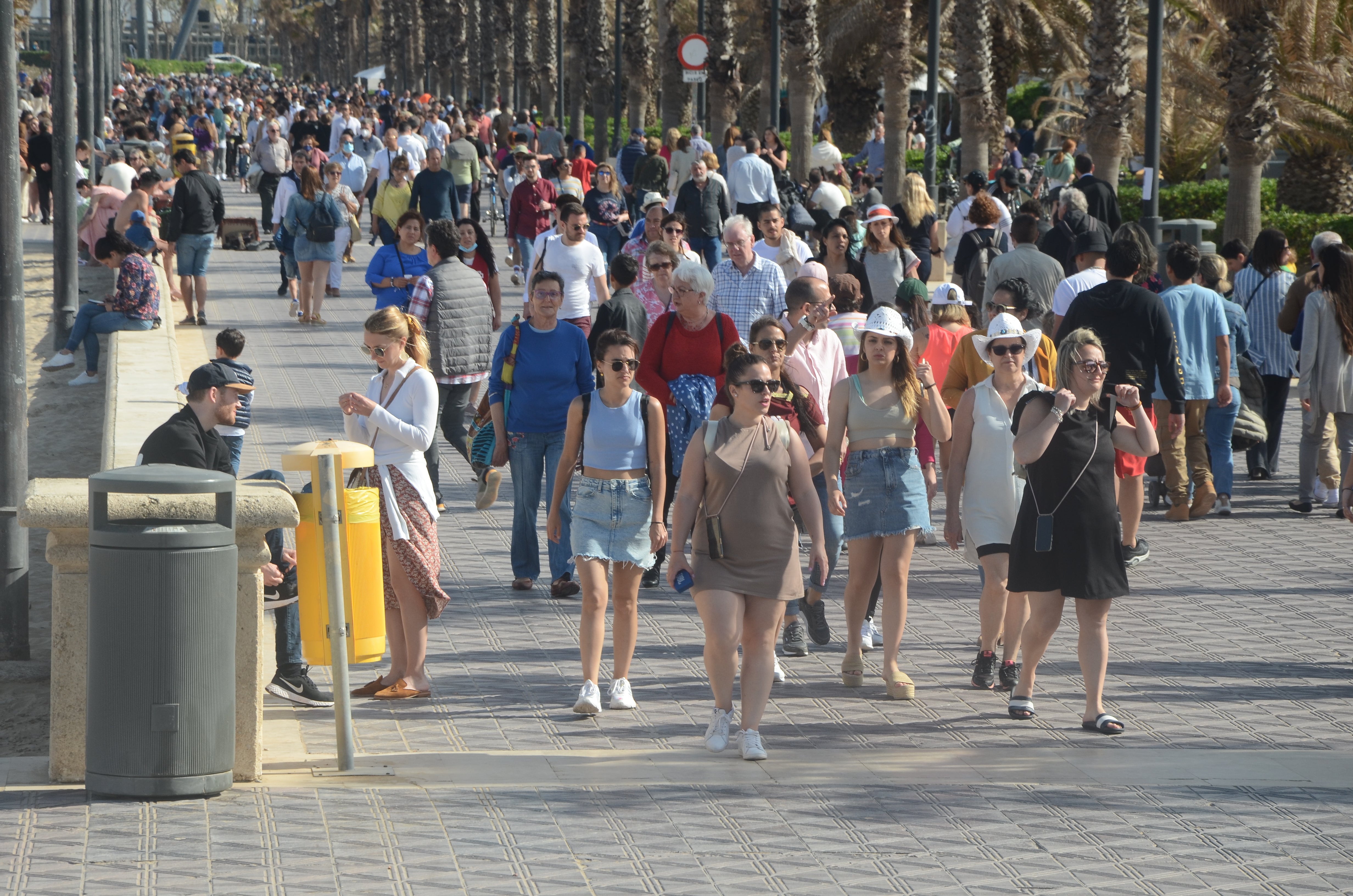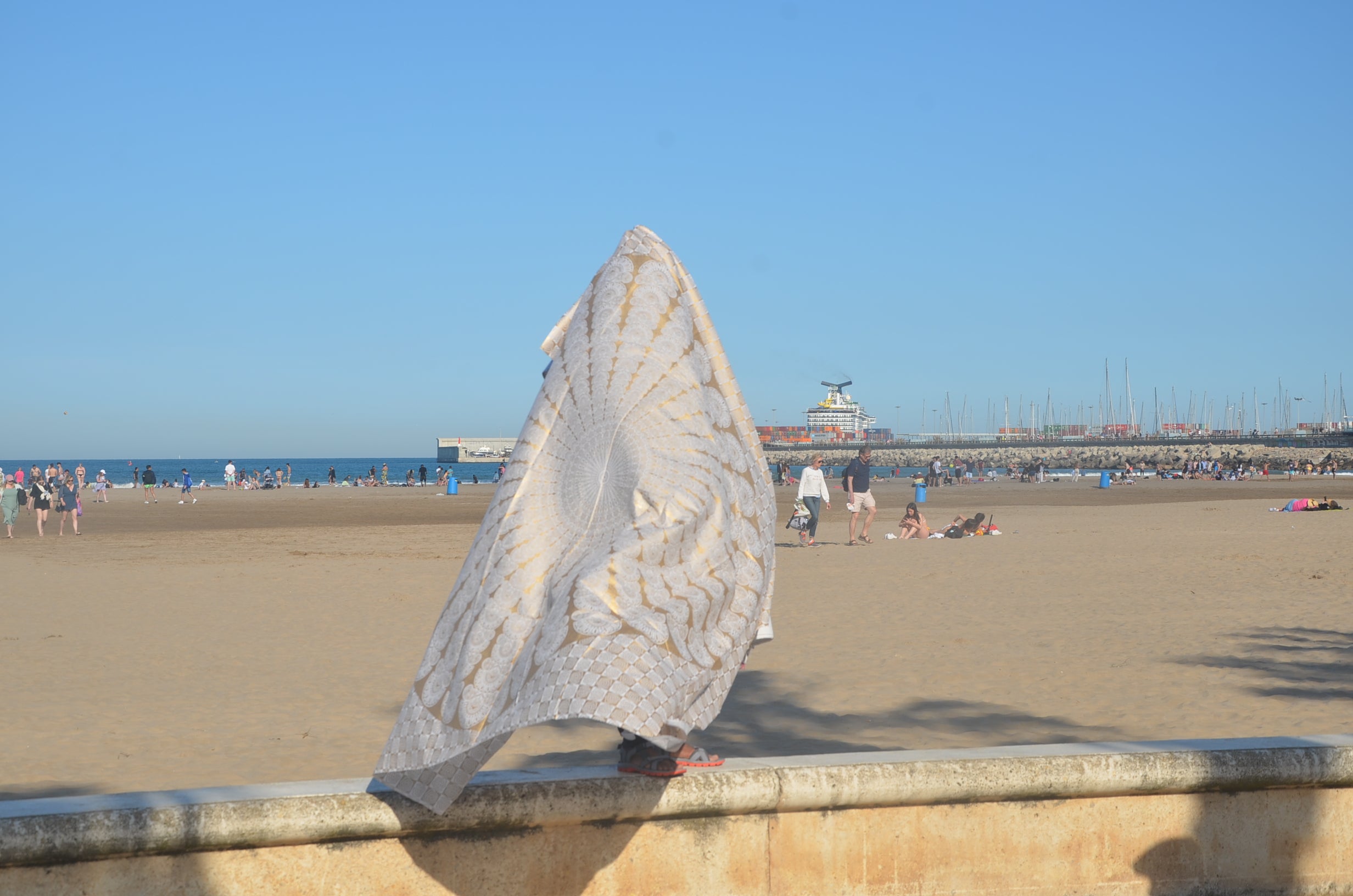Trying to make a living on the beaches of Valencia
For some, the footpath by the Malvarrosa beach is their workplace, as they seek to build a life for themselves, writes Mark Drummon

Out on the promenade at Malvarrosa beach, there is hardly any shade. There are no parasols, no covered sections, no canvas canopies. There are some tall, skinny palm trees, each with a small cluster of leaves 20m up, but they do little to bat away the sunbeams that beat down mercilessly, turning the paved walkway into a concrete hotplate.
This simmering footpath is the main tourist strip in Valencia, Spain’s third city, a place where the sun is almost always beating down. On one side of the promenade is a row of hotels and restaurants; on the other, a broad swathe of golden fine-grain sand runs down to the warm waters of the Mediterranean Sea. In summer, and in much of spring and autumn, the promenade is packed with holidaymakers and partying locals, all making their way to or from someplace. It’s like London’s Regent Street at Christmas, only with less clothing. And while to most the promenade is simply a road to somewhere, there is a group for whom it is their workplace.
Operating along the promenade, spaced out at comfortable distances from one another, are street hawkers selling sunglasses and other such tourism-related accessories. Between the beach and the promenade is a low concrete wall, about a metre high, which prevents sea winds from blowing sand across the footpath and into restaurants with open-air terraces. The hawkers perch – or sometimes stand – on this, with their wares spread out on the pavement in front of them. Many of them are immigrants from sub-Saharan Africa or the Indian subcontinent. At the best of times, they can just about eke out a living from the trade with holidaymakers. And given that tourism was the industry hit hardest by the Covid pandemic, the last couple of years have not been the best of times.
It’s late in the afternoon on a warm, sunny day in the middle of spring. Dil is holding a bedsheet above his head so that people can see its pattern as they stroll along the promenade. He tells me he pays €5 for each and offloads them for whatever he can. “I sell [for] 15, 20, 10, 8…” his voice trails off and he waves his hand in the air to indicate fluctuating profit margins.
Dil is short with cropped black hair and several days’ worth of stubble on his face. He is originally from Sialkot, a city in Pakistan’s Punjab province. Before he came to Spain he spent four years in Saudi Arabia.
“Why did you leave?” I ask.
“Saudi wasn’t good,” he says.
“Did you work there?”
“I had a job, but I didn’t like it.”
“Why did you come to Spain?”
“My feeling is Spain is a good country. I like it.”
He flew from Saudi Arabia to Spain, entering the country on a short-term tourist visa. That expired but he stayed. And that was nearly three years ago. He currently lives in Patraix, a nearby neighbourhood, in an apartment he shares with five cousins. They all sell decorative bedsheets imported from India.

He sends money to his father in Sialkot when he can. I ask how he was able to survive during the Covid-19 pandemic when the tourist trade dried up. He just shrugs his shoulders. He seems optimistic, not wanting to dwell on the bad times. He says he is looking forward to getting his “paper”. He tells me that when he reaches the three-year mark, which is only a few months away, he’ll be eligible to apply for a visa.
Dil is referring to arraigo social, “social integration” in English, the process through which people can acquire legal status in Spain following an illegal stay of three years, provided they meet certain requirements. Applicants must be able to speak Spanish and have a full-time job offer that will pay them at least the minimum wage. In lieu of a job offer, a credible business proposal and evidence of significant savings can be used to acquire the work permit.
Ainhoa Manero, director of Madrid-based law firm Sterna Abogados, explains exactly what would be entailed: “Savings, which can be in a bank account abroad, of around €12,000 and a strong business plan that can be backed up by ‘pre-contracts’ or letters of intention from Spain residents that show their intentions to hire [the immigrant’s] services as a freelancer once the permit is granted. [The application] also normally has to be backed up by work experience in the domain or an educational certificate related to the activity [the applicant] will carry out.”
An immigrant wishing to get an arraigo social work permit also has to prove that they have indeed been in Spain for three years. An entry stamp in their passport is one way. “Street hawkers normally come from sub-Saharan countries through Morocco, with the help of smugglers that either help them jump over the fence at the border or they help them reach ‘under the radar’ by boat, or sometimes even swimming or on improvised rafts,” adds Manero, via email. “So their biggest problem is they are never able to show an entry stamp in their passport.” Dil, however, should be able to satisfy this particular criterion.
Further along the beachfront, Sufyan is working the pavement hard. He is a more proactive salesman than Dil. He reminds me of a Cockney market trader, confident and gifted of the gab. He criss-crosses the promenade with his goods in his hands, engaging with people as they pass by. He is a young man, tall and handsome.

“Hola, buenos,” he calls out. Or “hello” to those he thinks don’t speak Spanish.
Sufyan takes a break, conceding the floor to a Spaniard singing Flamenco songs, and I take this opportunity to talk to him. He is also from Punjab, and like Dil, he too is just months away from being able to apply for an arraigo social visa following a three-year illegal stay in Spain. He covers a number of topics, from Kashmir – “a real problem” – to the ousting of Imran Khan as prime minister earlier in the year – “He is a good man.” We then talk cricket for a while, reminiscing about how good Khan was in his heyday.
It is 6pm now and he starts to pack up for the day, neatly folding up his stock of bedsheets and placing them into a black rucksack. I ask how many sheets he’s sold today. “Maybe 12, 13.” I think it will be more than Dil. A few minutes later I see Sufyan, Dil and a companion heading off somewhere together, presumably home.
Dan is from Senegal and sells sunglasses. While the euros flow for a nearby Spanish musical trio, for Dan not so much. On a good day he can sell eight or nine pairs. I ask him how many he’s sold today. “Little,” he says. I ask him how much he sells them for. “It depends.”
Dan’s been in Spain for four years. I wonder if he’s been able to get a visa via the arraigo social method.
“I’m not legal,” he confesses. “I don’t have a contract with an employer.”
“Why did you come here?” I ask.
“Perhaps for destiny. No particular reason.”
“And in the future?”
“Just work. Then go back. Who knows?”
“If the police catch you, what will happen?”
“I don’t know. If the police come, I run,” he says, pointing to the beach behind him. “In June, July, I never stay here. We have to go in.”
He indicates towards the small streets away from the main drag. The reason for the relocation, he explains, is that during the peak season the police patrol the beach on quad bikes, so it becomes too risky to hawk along the promenade. “It is forbidden to sell glasses. There are very many shops selling glasses and are paying taxes.”

“Where do you live?” I ask.
“In a house. We are four people.”
“Relatives?”
“Cousin. Brother. Wife, no.”
“During the Covid pandemic, there were no tourists,” I say. “How did you survive?”
“I had help.”
“From whom?”
“The government here.”
He says the government put some money into his bank account every couple of months for a period of two years. This surprises me, considering his undocumented status. Later, I run what Dan said by Raquel, a paralegal at Sterna Abogados.
“Sometimes, they do get help through the social services, it depends a lot on the social worker, but the government did not give money to people unless the social worker applied for any sort of special help for them,” she says. “As far as our understanding there was no generalised government contribution during the pandemic so my guess is the social worker must have applied for him and he received funds from the budget of either [government funded] associations, including the Immigrants Integration Centre or the town hall in his area, or any other ONG [organizacion no gubernamental, Spanish for NGO].”
It’s another Sunday and some familiar faces can be seen on the promenade. The hawkers are out in force. I see Dil standing on the wall, holding up a bedsheet. He sees me with my camera and he raises his arms a little further so that his head disappears behind the patterned cloth. It’s an odd spectacle: a bedsheet fluttering in the wind seemingly suspended in mid-air by itself.
It is noon and the summer sun is hovering menacingly over Malvarrosa. I leave Valencia in a few days so this may be my last visit to the beach. I walk along the promenade and I see Dil but I don’t see Sufyan. I also can’t find Dan today.
On the beach, lobster-red holidaymakers and bronzed locals dance across the piping hot sand with sandals in hand. On the pavement in front of them, sunglasses, straw hats and textile bracelets slowly bake in the heat. The hawkers’ only shade comes from the well-worn baseball caps on their heads.
Today, the sun is too strong for me and I can’t handle the temperature. The street sellers, however, are made of sterner stuff. They don’t mind a bit of heat as long as someone buys their wares. But today is not for me, so I leave them and head off in search of shade and liquid refreshment. As I turn the corner, I look back for a moment and watch them, operating in their regular spots along the promenade, trying to make a sale, toiling away beneath the blistering Mediterranean sun.
Some of the names in this article have been changed to protect identities




Join our commenting forum
Join thought-provoking conversations, follow other Independent readers and see their replies
Comments